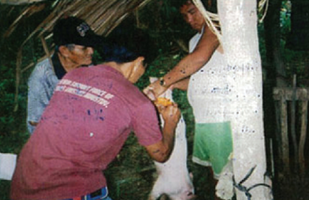
Barangay Livestock Assistance Program
Bohol
2000
The livestock sector was the most neglected with the devolution of agricultural services to the local government units. In the province of Bohol, livestock raising was recognized as a potential source of livelihood. But its potential had not been realized due to the lack of a barangay level service delivery mechanism. The Provincial Government of Bohol then took the initiative of establishing the Barangay Livestock Aide (BALA) Program in June 1997 under the Office of the Provincial Veterinarian.
The program aims to enable the barangay to attend to any livestock-related needs of its local community. In the past, survival rates of domestic animals were very low. Thus, an innovative strategy was introduced by assigning a livestock aide in every barangay. They are well-equipped and capable livestock assistants who were trained to provide assistance and services among barangay residents on how to raise livestock animals. Likewise, they were also trained to do the following: a) to establish actual disease occurrence in the area; b) to come up with a realistic barangay livestock profile; c) to design a workable animal health program (e.g. vaccination and deworming); d) to conduct treatments and/or administration of drugs under the supervision of the municipal livestock technician or licensed veterinarians.
There used to be only 69 livestock technicians (26 technicians from the provincial government and 43 from the municipal government) who provided services to the 1,109 barangays (152,324 households) in the whole province. Today, there are 517 new barangay livestock aides who serve 436 or 39% of the barangays in the province. With the implementation of the program, an effective and efficient communication was put in place, which played an important role in the prevention and control of the Foot and Mouth Disease and rabies in the province. Likewise, the former hesitant barangay residents are now motivated to raise their own backyard piggery and poultry farms. They are now assured of a “livestock doctor” who will take care of and assure the survival of their farm animals. And there is also an increase in the number of households engaged in livestock raising, thus, additional income for the family. In the past, the supply of meat produced was just enough to meet the demands of the local market but now it can also supply neighboring provinces.
This program is recognized as a Trailblazing Program, a finalist for the 2000 Galing Pook Awards.


